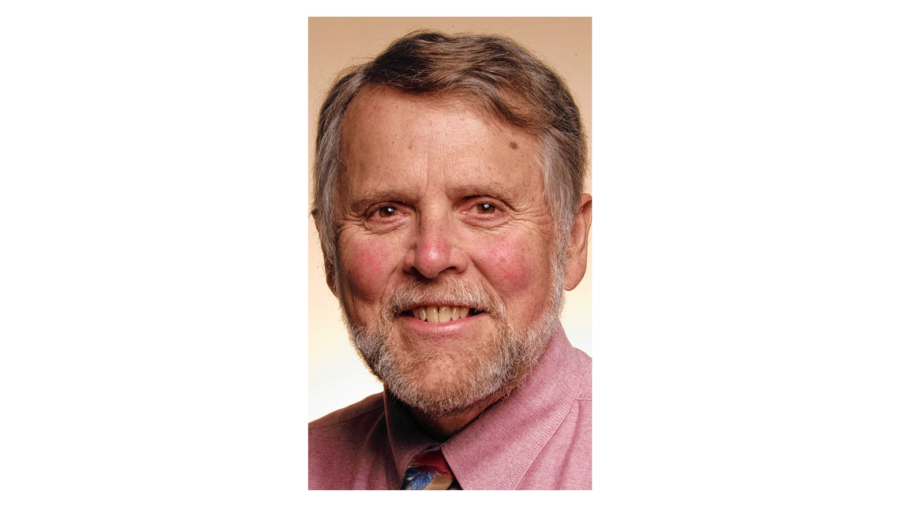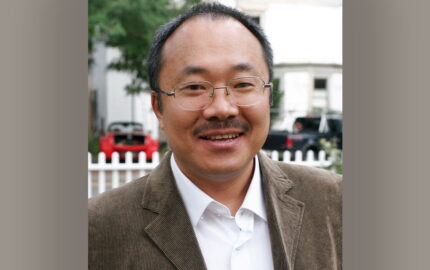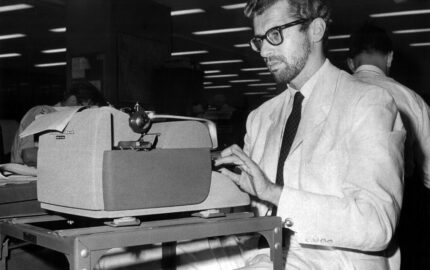Mike Pride, whose love of language, gift for leadership and devotion to journalism lifted the Concord Monitor to national prominence during his quarter century as editor, died on Monday, April 24, 2023. Pride, 76, succumbed to a longstanding blood disorder.
Throughout his working life, Pride read voraciously and wrote unceasingly. He kept a daily journal for almost 40 years, crafted hundreds of columns for the Monitor and national publications, and authored, co-authored or edited eight books. The nine years he spent as a Pulitzer Prize board member beginning in 1999 marked the pinnacle of his career, and he came out of retirement to serve as administrator of the prizes for three years beginning in 2014.
He was a man of home and community, devoted in marriage for 53 years to Monique (Praet) Pride, the father of three sons and grandfather to six children. For 36 years the Prides lived in a house on Holt Street in Concord, filling it with his books and the holiday cooking smells of her native Belgium. He loved no place more than their summer cottage on Rand Pond in Goshen, which he named Point of View. He would sit for hours on the porch, serenaded by loons as he read and wrote.
Words were his bond with others. He developed deep relationships with New England poets by telling their stories and reviewing their work. He wrote columns explaining controversial decisions to Monitor readers. He opened the paper to the community, creating a rotating board of local contributors and editing letters to the editor himself. For years he printed columns on state prison life written by an inmate who was serving a life sentence for murdering his ex-wife’s boyfriend. His close friends included a national poet laureate, Donald Hall, and the insightful but unrepentant killer, Ray Barham.
The newsroom over which he presided earned the reputation of a launching pad for young journalists, who were held to high standards and trusted with big stories during what was a golden age for American journalism. His retirement party in 2008 drew dozens of appreciative alums from around the country.
The Early Years
Pride was born on July 31, 1946, in Bridgeport, Conn., and grew up in Clearwater, Fla. He got his first taste of newspaper life from his cousin, Ron Pride, who allowed him to tag along during night editing shifts in sports at the Tampa Tribune. He was 14 when Ron called to say the paper needed someone to cover a high school track meet. The meet finished at 10 p.m., and Pride ran home, composing his story on the way. He phoned it in as his cousin typed. The next morning, he felt the thrill of seeing his name in print.
He came of age in the racial, musical and wartime tumult of the Sixties. He enrolled at the University of Florida, flunking out in 1966.
Knowing the draft was next, Pride enlisted in the Army. He qualified for the Defense Language Institute in Monterey, Calif., where he learned Russian before deploying to West Germany. He lived on a farm and worked in a windowless truck at a radio intercept station on the Elbe River, recording chatter between Soviet tankers stationed along the far bank. One night in 1968 he caught a careless transmission suggesting the invasion of Czechoslovakia was at hand. A timid lieutenant refused to label his intercept as urgent and filed it into oblivion.
He met Monique in a bar. They danced all night, and less than a month later he asked her to marry him. In January 1970 she did, and that fall she gave birth to their first son, Sven. In years to come Yuri and Misha followed. Fifty years later the Prides still held hands in public. “It’s one of the great love stories,” said a friend, the poet Wes McNair.
A Life in Journalism
Following Pride’s Army discharge, his cousin opened the door to a full-time job at the Tribune, with night hours that allowed him to take classes at the University of South Florida by day. He earned a bachelor’s degree in American studies in 1972.
The year after graduating Pride left sports for the news side at his hometown paper, the Clearwater Sun.
In 1977, the Prides moved to Tallahassee so he could take an editing job at the Democrat, a bigger paper in the national Knight-Ridder chain. It didn’t take him long to realize that rising through a chain meant frequent moves to places where he didn’t want to raise a family.
That recognition coincided with a call from Tom Gerber, the editor of the Concord Monitor, looking to hire an eventual successor to run the newsroom for George Wilson, the publisher and a member of the family that owned Newspapers of New England, the Monitor’s parent company.
A few days after he accepted the job, a box from Wilson arrived by mail. It contained several books about New Hampshire, including one that resonated: “String Too Short to Be Saved,” Donald Hall’s memoir about the family farmstead near Concord to which he had returned to live as a poet.
Wilson wanted a great newspaper, and he turned Pride loose to build one. During Pride’s years, the newsroom staff grew from 18 to 46 – an investment more typical of a far bigger paper.
The young Pride was neither diplomatic nor subtle. He replaced those who didn’t meet his standards or embrace his approach with colleagues from Florida who did. He pushed the paper away from what he considered advocacy journalism, bent on opposition in its news coverage to the state’s inflammatory Republican governor. He built the front page around columns about everyday people in the community written by one of those Florida colleagues, Tom Keyser.
He encouraged reporters to take chances while articulating his expectations through unflinching written critiques of the daily paper.
Pride’s newsroom could feel like graduate school. He invited national reporters who came through Concord to discuss their craft over brown bag lunches. Hall, McNair and other poets attended newsroom potlucks in crowded living rooms, where they read their work and talked about writing.
In a newsroom of 20-somethings, the line between work and social life blurred. But there was resentment over pay and expectations as well. In 1981, complaints by seven staffers led to a federal wage and hour lawsuit, alleging they were pressured to work extra without reporting it on their timecards.
Wilson fought the complaints and the law, arguing that reporters should be treated not as hourly workers but as salaried professionals. The case dragged on for a decade before the Monitor lost. Fourteen staffers, most of them no longer at the paper, got back pay.
Pride was in court for that case on the morning in January 1986 when the space shuttle Challenger exploded with a Concord teacher, Christa McAuliffe, on board. It was the biggest story of his career, and for Concord, its greatest trauma.
John Fensterwald, then managing editor, remembered a newsroom stunned into uncertainty. “We just couldn’t grasp what had happened,” he said. “And then Mike appeared. It was like George Washington coming to marshal the troops.”
It was one of many important stories the Monitor covered during Pride’s tenure: the deinstitutionalization of state hospital patients without a community network for support; the nomination of former state attorney general David Souter to the U.S. Supreme Court; the efforts of New Hampshire’s Catholic diocese to protect priests who committed sexual abuse; the appointment of the world’s first openly gay Episcopal bishop; a local man’s murderous shooting rampage in the North Country; a frank exploration of teen sexuality.
Covering Politics
Every four years New Hampshire’s presidential primary put the state at the center of national politics, and the Monitor with it. Young reporters and photographers covered not just who said what, but also traveled to write hometown profiles of major candidates. Pride pushed them to explore issues through their effects on the lives of local people. Contenders trooped in for editorial board interviews led by Pride. He prepared carefully and pressed with follow-up questions; some, hoping for an endorsement, came back.
One who did win the Monitor endorsement was Bill Clinton, who wanted it badly enough to keep a repeat appointment despite a 102-degree fever.
Democrat Jeanne Shaheen, the first woman elected governor in state history, was a particular focus of Monitor coverage as she took office in 1997 – and a particular target of Monitor editorial criticism when she refused to fund local schools through an income tax. “He grilled me hard on that,” said Shaheen, now a U.S. senator. “… He was tough, but I always felt that I got a fair hearing.”
Awards, Poetry and Books
During Pride’s tenure the Monitor won recognition from the American Society of Newspaper Editors, Time magazine and the Columbia Journalism Review. It took an outsized share of regional journalism prizes and became a magnet for young journalists hoping to refine their skills in hopes of leaping to a next big job.
In the early 1990s the paper moved from its dingy downtown home to an expansive new building outside the city, converted from afternoon to early morning publication and added a Sunday edition.
Over time Pride won a series of personal honors: a Nieman Fellowship at Harvard in 1984 (as a member of the Nieman class of 1985), the National Press Association’s Editor of the Year award in 1986, a Yankee Quill award for contributions to New England Journalism in 1997.
His interests outside the Monitor flourished. From 1998-2001, he wrote a monthly column for the national Brill’s Content magazine. He planned and hosted poetry nights in Concord for 20 years, helping New England’s poets foster a community of readers and find community among themselves.
Pride collaborated on three books with newsroom staffers, two of them rising out of Monitor projects: profiles of 100 notable 20th century state figures, and the oral histories of more than 40 New Hampshire men and women who experienced World War II at home and at the front. He pursued personal book projects too, co-authoring a New Hampshire Civil War history and a World War II memoir, followed by a series of his own books.
The Pulitzer Board
In 1999 he was named a member of the Pulitzer Prize board, a group of 18 distinguished journalists and academics responsible for honoring the best in American journalism, arts and literature. It involves immense piles of reading across diverse subjects, followed by intense deliberations. “It’s sort of the best book club in the world,” said Danielle Allen, a political theorist and Harvard professor who served on the board with Pride.
In 2008, his last year on the board, he served as its co-chairman. It was also the year of his retirement from the Monitor – and the year the Monitor’s Preston Gannaway was named one of three finalists in feature photography for her coverage of a Concord family coping with a parent’s terminal illness.
In keeping with board practice, Pride left the room while his colleagues discussed the contenders. He re-entered to learn Gannaway had won, then sat to resume leading the meeting.
Ann Marie Lipinski, a board member who now serves as curator of the Nieman Foundation, saw tears in his eyes.
“It was an extraordinary moment,” she said, “watching this guy who was working very hard to balance the extra pride he had in what was a historic moment for the Monitor … and the code of conduct that he always brought to the work: deliberate fairly. He didn’t let the two touch.”
He came out of retirement in 2014 to serve as Pulitzer administrator, a demanding job that entailed a move for the Prides to New York City. It was a pivotal time. He helped orchestrate events around the country and a website redesign in celebration of the Pulitzer centennial in 2016. The Nieman Foundation hosted the final event of the centennial year at Harvard University and Pride attended. Pulitzer Prize-winning journalists, composers, authors, poets and playwrights gathered over two days to address the theme “Power: Abuse and Accountability.”
Pride also guided the board through the tricky business of revising print-centered rules to reflect the diversifying reality of digital-age journalism.
“It was a moment of connecting past to future, but smoothly,” said Allen. “… He was just a person of incredibly good judgment.”
During Pride’s time as administrator, a longtime blood disorder began its transition to an active blood cancer. He re-retired in 2017. He became a trustee of the New Hampshire Historical Society and immersed himself in more writing projects, including a history of Key West in the Civil War, which was published in the fall of 2020, and a wartime biography of Harriet Dame, a Civil War nurse from Concord, published in 2022. His ninth book, reflecting on the lives and work of the New England poets he knew, will be published posthumously.
“It’s quite possible that alumni of the Concord Monitor under Mike Pride are among the most anxious journalists working today,” observed Felice Belman, who succeeded him as editor of the Monitor and is now deputy metro editor at the New York Times. “If so, it’s because we know how good it was, and we know exactly what’s been lost.”
The excerpts above are from a longer appreciation written by Mark Travis, Pride’s longtime friend, co-worker and collaborator at the Concord Monitor in New Hampshire.



